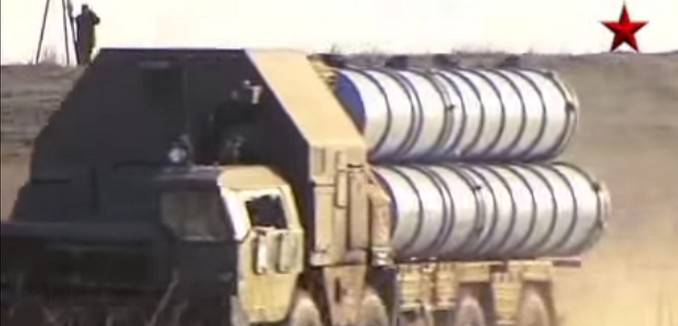Russia will complete a deal, as early as next week, to sell the sophisticated S-300 surface-to-air missile system to Iran despite longstanding American objections, Fox News reported today.
Despite a ban on arms shipments to Iran under international sanctions, Russia appears willing to proceed with the sale of advanced S-300 surface-to-air missiles to the country — in a development triggering objections from the Obama administration.
“We have long expressed our concerns over reports of the possible sale of this missile system to the Iranians,” Pentagon spokesman Capt. Jeff Davis told Fox News. …
“The text of the contract is ready and our friends will go to Russia next week to sign the contract,” Iran Defense Minister Hossein Dehghan reportedly said.
An American defense official told Fox News that the S-300 “is a very capable weapons system that can bring down U.S. or Israeli jet aircraft.” It is believed that the missiles will be used to protect Iran’s nuclear facilities and may be deployed in an offensive capacity.
Russia originally agreed to sell the S-300 system to Iran in 2007, yet agreed to a moratorium on the sale after the passage of UN Security Council Resolution 1929 in 2010. In April of this year, Russia announced that it would no longer observe the moratorium. A week later, however, Russia said it would not deliver the systems in the near future.
It was reported recently that Gen. Qassem Suleimani, commander of the Islamic Revolutionary Guard Corps (IRGC) – Qods Force, traveled to Russia last month in violation of existing international travel bans, which were imposed on him due to the IRGC’s extensive involvement in terrorist activities.
According to the terms of the Joint Comprehensive Plan of Action (JCPOA), European and United Nations sanctions on Suleimani will be lifted after eight years. Lt. Gen. (ret.) Michael Barbero called the lifting of sanctions on the commander a “shameful betrayal” of the hundreds of American servicemen who were killed and injured in Iraq during attacks orchestrated by Suleimani and his allies.
An article covering Suleimani’s trip to Russia in The New York Times last week observed:
Even for supporters of the accord, General Suleimani’s travel raises questions about Russia’s intentions. The Obama administration has repeatedly asserted that Russia was helpful in negotiating the nuclear accord. Last month, President Obama called President Vladimir V. Putin to thank him for Russia’s “important role in achieving this milestone,” the administration said in a July statement.
But a closer look at the negotiating record shows that Russia sometimes complicated the Obama administration’s effort. Secretary of State John Kerry has acknowledged that Russia supported Iran’s demand that a United Nations arms embargo on Tehran be lifted immediately.
[Photo: vexed123 / YouTube ]




